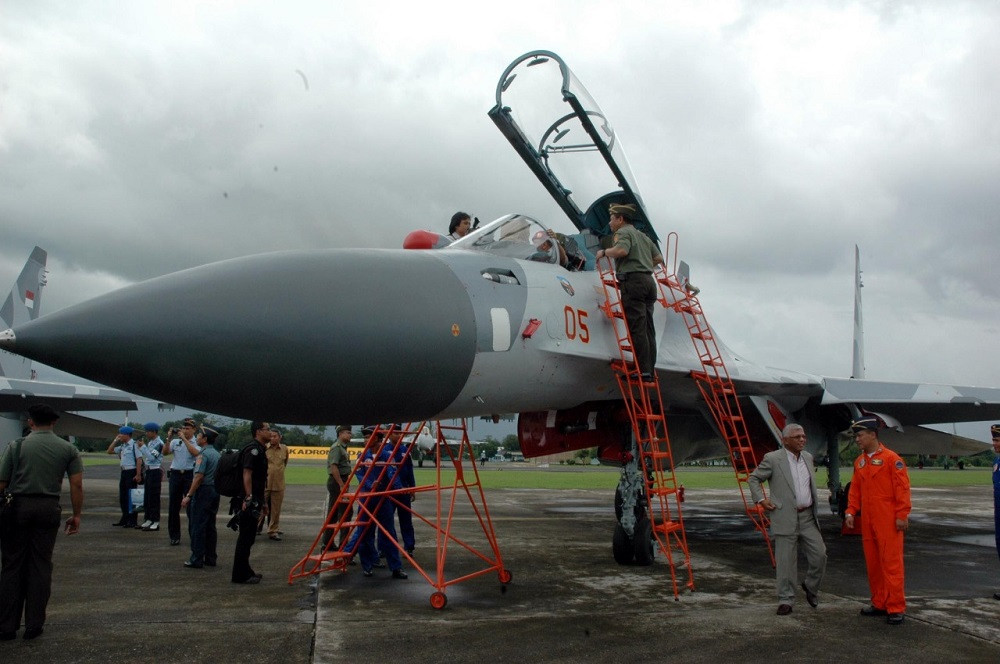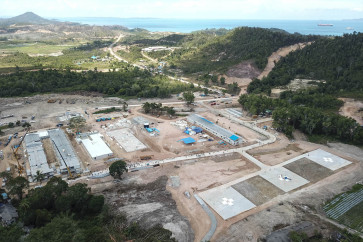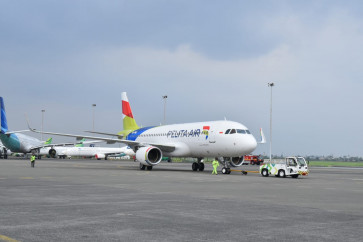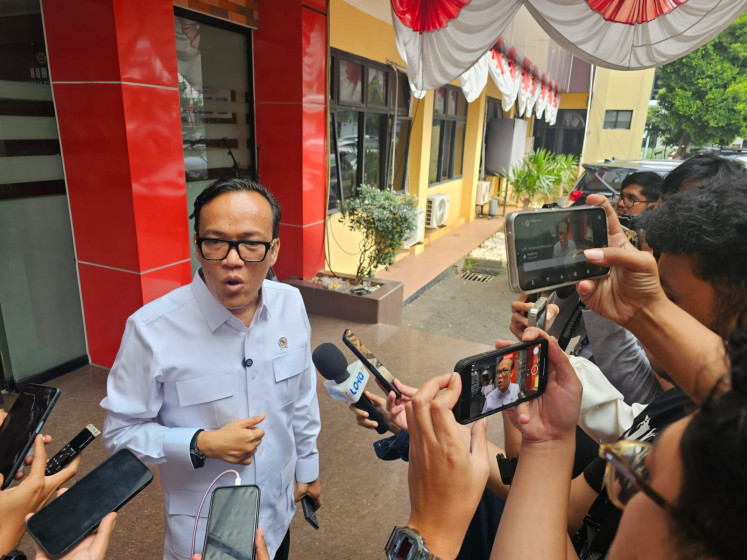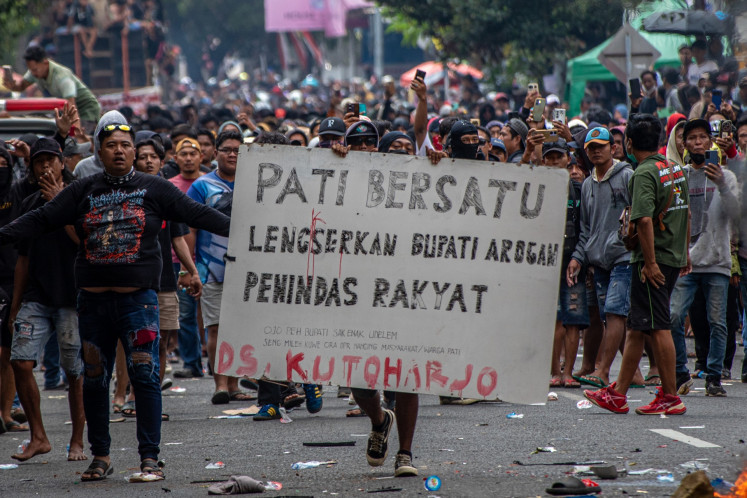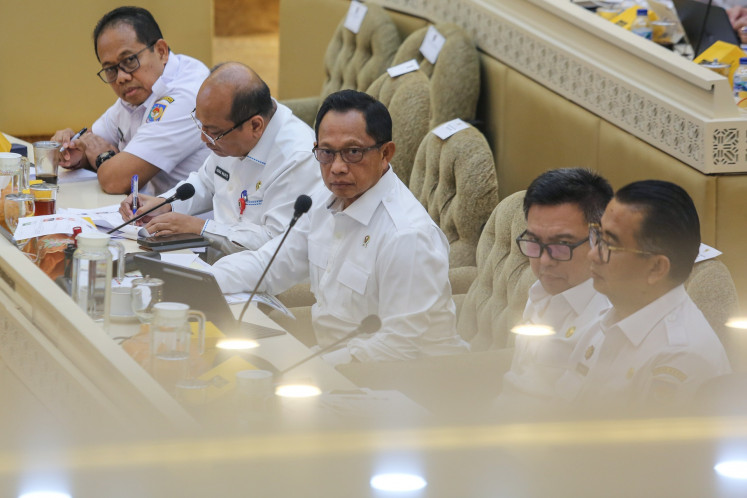Popular Reads
Top Results
Can't find what you're looking for?
View all search resultsPopular Reads
Top Results
Can't find what you're looking for?
View all search resultsLong-term TNI modernization plan makes sense
It is important to keep in mind that the current security context will evolve, and that anticipating threats in the mid to long-term is essential.
Change text size
Gift Premium Articles
to Anyone
D
iscussions and debate on the draft presidential regulation (Perpres) to allocate special funding in order to support the modernization of the Indonesian Military (TNI) have been widespread in the media in recent weeks. While debate is necessary, observers must not forget how urgent the need for modernization of the TNI is.
The controversy over the Perpres could appear surprising as the final numbers have not been agreed yet by the government. Meanwhile, TNI modernization is still a topic that gathers a lot of support from civil society. A recent survey by Litbang Kompas shows that 92.8 percent of respondents support the idea.
As a matter of fact, the idea behind the draft Perpres is interesting to analyze. It is one of the few times that Indonesia has seemed to look forward and to adopt a proactive, forecasting strategy to adapt its needs to the evolution of the security context.
The first thing to keep in mind is that the Perpres seems to support the idea that the procurement plan will focus on several decades. Actually, Indonesia’s lack of strategic depth when it comes to defense planning has been a subject of unceasing criticism for years by observers and experts from all political sides. It could be the first time that the Defense Ministry has proposed a procurement strategy that could be reliable in the long term and actively participate in the modernization of the TNI. It is important to keep in mind that the current security context will evolve, and that anticipating threats in the mid to long-term is essential.
This evolution could take several forms, and it is not playing prophet of doom to anticipate it. The future security environment has been described by numerous think tanks around the world. It is little surprise that a large majority consider the Asia-Pacific region as one of the most conflict-prone areas in the future.
Actually China’s current military build-up and its aggressiveness shown in territorial disputes could expand, as has been seen in recent years. Beijing’s strategy of militarization in the South China Sea’s disputed atolls, shoals and other reefs should be taken seriously. In the meantime, state-sponsored illegal, unreported and unregulated (IUU) fishing has also surged in the past decade, exhibiting the willingness of several states to use force – or at least to proceed to shows of force – to secure resources.
Analysts agree that regional and global power competition could increase, mainly to secure resources, in a deteriorating context. It is fair to say that the region will continue to have a vital importance: in parallel, more crises might emerge in the mid to long-term, which could be related to climate change impacts (rising sea levels and competition for marine and coastal areas), food security and water scarcity, or as we are living through right now, a pandemic threat.
While all these probable crises cannot – and should not – be solely handled by the armed forces, the potential local, regional or global conflicts that might emerge are supporting the idea that the modernization of armed forces should be done on the long term and encompass a wide spectrum of threats. Indonesia, given its geographic location, should be ready to face threats in the future and be able to protect its sovereign territory while contributing to regional and global peace.
Furthermore, the Perpres should be seen as a continuation of the ongoing modernization program called Minimum Essential Force (MEF), which started in 2009.Targeted for completion in 2024, many indicators show that the government or the TNI will not be able to complete the MEF program on time. For example, in all likelihood, the original target of operating 11 fighter squadrons, 151 warships and 12 submarines by 2024 will not be achieved as, even if there is the budget to do so, it will take years for manufacturers to produce and deliver these platforms to the TNI.
Therefore, it is not surprising that as of 2019, the modernization program had only reached 63.19 percent -from the supposed 75.54 percent, with the lowest realization (45.19 percent) in the Air Force. The delay in modernization has also forced the TNI to delay the retirement of some platforms and tossed around some weapons systems from one unit to another. This was particularly the case in early 2020 when the Air Force transferred three Su-27/30 from 11th Squadron to 14th Squadron as the latter squadron had no organic aircraft since 2016 due to the delay in the F-5E/F replacement program.
Moreover, the long-term modernization plan proposed via the Perpres should, ideally, be one of the answers to the chronic condition of the TNI's aging defense equipment. According to the Defense Ministry, currently, more than 50 percent of TNI weapons are not only old but also inoperable. Naturally, the risk of failure (or event accident) and the maintenance and operational costs of items of defense equipment will increase as they age, while operational readiness will decline. In addition to replacing old or damaged equipment, modernization is also needed in terms of capacity building. In other words, a long-term modernization plan will give the TNI access to various modern weapons systems that it has not previously operated, both in terms of quality and quantity.
Lastly, as the country is aiming to be one of the five biggest economies in the world by 2045, Indonesia should be able to play a more important role on international stages. To do so, Indonesia needs to be considered a trusted and capable partner, including in regard to its contribution to regional and global peace and security.
Thus, military modernization should consider the fact that present-day and future operations will increasingly rely on interoperability with allies and partners with growing operational demand and tempo, which is something that the TNI can barely fulfil in its current condition and posture.
In any case, seeing how the MEF plan has been delayed, a new strategy might be needed. From this perspective, a long-term procurement plan supporting a long-term effective strategy should be considered as vital to support the modernization of the TNI, in order to protect the nation, its sovereignty and its interests.
***
Muhammad Fauzan Malufti is a research analyst on defense matters at Semar Sentinel Pte Ltd, a consultancy, where Alban Sciascia is a director. The views expressed are personal.

